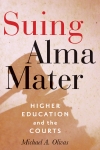Guest post by Michael A. Olivas
On March 26, 2014, National Labor Relations Board Chicago regional director Peter Ohr held that Northwestern’s football players were employees and, as a result, eligible to vote whether they would unionize.
Ohr wrote, “It is clear that the scholarships the players receive are compensation for the athletic services they perform for the employer . . . It cannot be said that the employer’ s scholarship players are ‘primarily students.’ ” If this regional ruling is upheld by the NLRB, and the student athletes choose to join the College Athletes Players Association, they will be allowed to organize and bargain collectively with Northwestern and other “employers.”
Previous decisions had held that graduate students could not organize. This was the first determination of its kind by a NLRB decisionmaker.
While the twenty-four page decision many interesting features, I believe it will not stick. Ohr does not fully account for earlier decisions about graduate students and medical residents, who functionally resemble employees much more than do athletes; he does not get the fundamentals of financial aid and scholarships right; and he misapprehends the relationship of “academic studies” to academic lives of students. He is not entirely wrong on all points, most notably when he discusses the scandalous way that the schedules of some sports—basketball and baseball/softball come to mind—have been lengthened beyond a reasonable point. And there is no doubt that students get short shrift in the commercialization of the revenue sports in particular, and that the money generated by college sports is so broad and deep that boosters and gamblers have cheapened and debrided the ethics of traditional student-athletes. And wayyyyyyyy too many colleges are out of control with regards to the governance of athletics, including my own beloved Ohio State University, where scandals weakened both the otherwise-successful football coach and the OSU president.
Even though the National Collegiate Athletic Association (NCAA) was not a formal party to these particular proceedings, its behavior over the years has made the worst of a bad situation. I urge the adults involved to sit down and figure out a medium-speed way to assist students, perhaps by allowing them to own their own images or undertake endorsements that would go into a fund for redistribution, or by shortening of the absurd and disruptive travel schedules that have some basketball teams playing over thirty-five games in a year and baseball teams more than seventy. These intensive schedules make it impossible to maintain with a straight face that the equation is “student”-athlete. My best hope is that this decision, while inappropriate, will be the wakeup call to jolt the NCAA (or Congress) into action.
Michael A. Olivas is the William B. Bates Distinguished Chair of Law at the University of Houston and director of the Institute for Higher Education Law and Governance. He will be signing copies of his most recent book, Suing Alma Mater: Higher Education and the Courts, at 12:30 p.m. on Friday, April 4, at the American Educational Research Association annual meeting in Philadelphia. There, he will receive the association’ s 2014 Social Justice in Higher Education Award. Books will be $20.00, tax included.
copies of his most recent book, Suing Alma Mater: Higher Education and the Courts, at 12:30 p.m. on Friday, April 4, at the American Educational Research Association annual meeting in Philadelphia. There, he will receive the association’ s 2014 Social Justice in Higher Education Award. Books will be $20.00, tax included.
